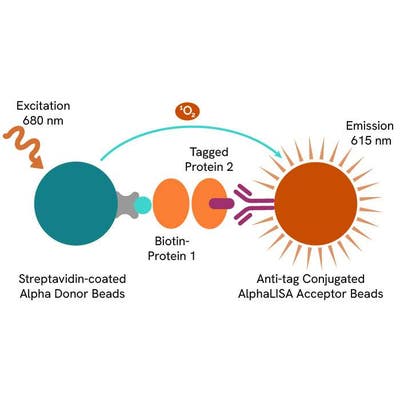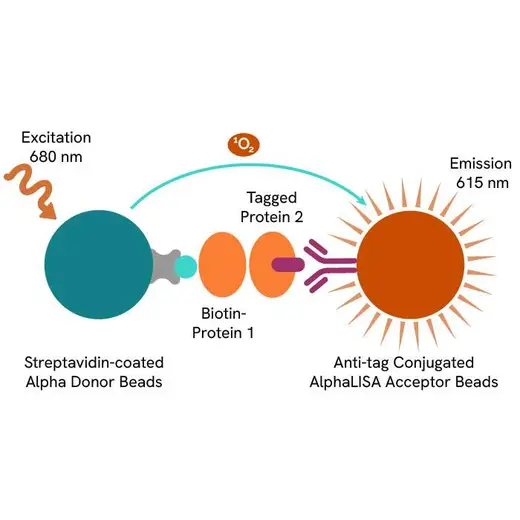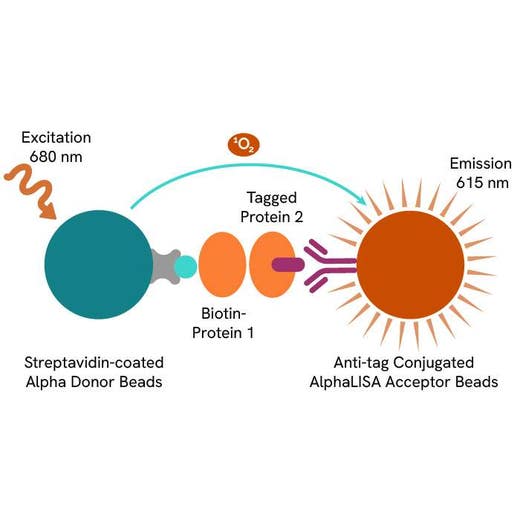
AlphaLISA Human TNF-α / TNFR2 Binding Kit, 500 Assay Points


AlphaLISA Human TNF-α / TNFR2 Binding Kit, 500 Assay Points






| Feature | Specification |
|---|---|
| Application | Protein-Protein Interaction |
| Sample Volume | 5 µL |









Loading...
Product information
Overview
The AlphaLISA™ human TNFα/TNFR2 binding assay uses anti-6xHis AlphaLISA Acceptor beads to capture the His-tagged TNFR2 and Streptavidin-coated donor beads to capture the biotinylated TNFα. Donor beads and Acceptor beads come into proximity through TNFα binding to TNFR2. Excitation of the Donor beads provokes the release of singlet oxygen that triggers a cascade of energy transfer reactions in the Acceptor beads, resulting in a sharp peak of light emission at 615 nm.
Formats:
- Our 500 assay point kit allows you to run 500 wells in 96-well or 384-well format, using a 20 µL reaction volume.
- Our 5,000 assay point kit allows you to run 5,000 wells in 96-well or 384-well format, using a 20 µL reaction volume.
AlphaLISA features:
- No-wash steps, no separation steps
- Ease-of-use: few addition steps, fast assay development
- Broad range of affinities: detect strong or weak interactions, from pM to mM affinity
- Distance: measure very large protein or antibody complexes – spanning up to 200 nm or more
- High avidity: multiple binding sites on each bead enables use of nanomolar concentrations of antibodies or proteins, as well as use of low affinity binders
Tumor necrosis factor alpha (TNFα) is an immunity-modulating cytokine that is required for defense against infectious diseases and carcinogenesis. TNFα activates signals through its two receptors [TNF receptor 1 (TNFRI) and TNF receptor 2 (TNFRII)]. TNFRI is ubiquitously expressed and can be fully activated by both the membrane-bound and soluble trimeric forms of TNFα, whereas TNFRII is found mostly on certain populations of immune cells and respond to the membrane-bound form of the TNFα homotrimer. However, a block of TNFα-mediated host defense often increases the risk of bacterial or viral infection or of the development of lymphoma. Thus, a thorough understanding of the function of the TNFα-TNFR binding is important for the design of optimal therapies against the various TNFα-related autoimmune diseases.
Specifications
| Application |
Protein-Protein Interaction
|
|---|---|
| Automation Compatible |
Yes
|
| Brand |
AlphaLISA
|
| Detection Modality |
Alpha
|
| Product Group |
Kit
|
| Sample Volume |
5 µL
|
| Shipping Conditions |
Shipped in Blue Ice
|
| Target |
TNFα,TNRFR3
|
| Target Class |
Binding Assay
|
| Target Species |
Human
|
| Technology |
Alpha
|
| Therapeutic Area |
Inflammation
|
| Unit Size |
500 assay points
|
Video gallery
Resources
Are you looking for resources, click on the resource type to explore further.
Advance your autoimmune disease research and benefit from Revvity broad offering of reagent technologies
Many tumor cells, which under normal, healthy conditions would be recognized by the body’s T cells and thereby targeted for...
Loading...


How can we help you?
We are here to answer your questions.






























